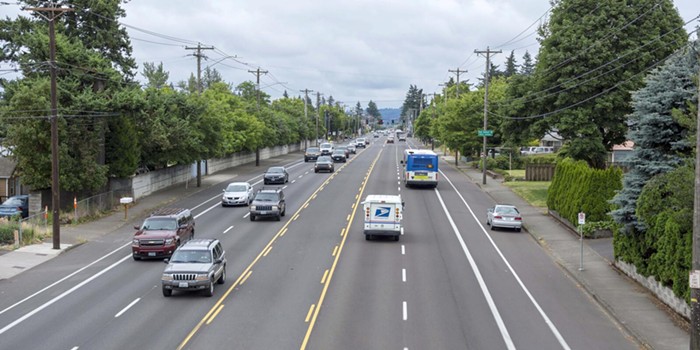Downtown's Portland Patrol, Inc. (PPI) private security guards are contractually obliged to "wake up all individuals who use [the] sidewalk, and business doorways, as sleeping locations," and to "stop offensive conduct wherever possible," according to their contract with the Portland Business Alliance—information which has been kept under wraps until last week.
PPI guards have come under increased scrutiny over recent months because they dress like cops, have the power to issue park exclusions as well as verbally enforce the mayor's controversial new sit-lie ordinance, and often carry guns—however, they have no public oversight of their activities ["Trust Me, I'm a Rent-a-Cop," Feature, May 3].
The wording of certain sections of this contract is troubling to homeless rights' activists.
"The part about waking up the homeless raises huge concerns—especially in the context of not having any oversight in how PPI officers are trained and directed in dealing with people experiencing homelessness," says Street Roots Director Israel Bayer. "We will be asking our attorneys to see whether or not this is even legal."
The contract also reveals that PPI is being paid more than $1.5 million a year by the Portland Business Alliance (PBA) through the PBA's Clean and Safe program. PPI was paid $1,578,690.59 for the 2006-2007 fiscal year to provide 22 full-time equivalent guards. That's just a little cheaper than employing 22 real police officers for a year, which would cost $1,716,000, according to Police Bureau Budget Analyst Stacy Jones—who says officers cost the city an average of $78,000 a year in salary and benefits. Real officers, however, would be subject to full citizen oversight and more thorough ongoing training than their private counterparts.
PPI has refused to tell the Mercury how many guards it employs, although sources have indicated the company employs 17 armed and 13 unarmed officers, presumably on a part-time basis to make up the 22 full-time positions stipulated in the contract.
The contract also requires PPI to have a $1 million insurance policy—in case anyone sues its officers—and PPI agrees to indemnify the PBA and City of Portland against any civil claims that arise as a result of its work. There is nothing in the contract, however, to clarify when a PPI officer can pull his or her gun.
What the contract does say is that PPI officers must "not attempt to handle situations that are dangerous or that are beyond their authorization and ability to deal with safely," and are expected to call for police assistance when such situations arise.
"But here we have another example of lack of transparency," says Alejandro Queral of the Northwest Constitutional Rights Center. "We would assume from this that the rule of thumb should be non-engagement, but the question then becomes why are PPI officers being allowed to carry guns?"
PPI guards are also required never to "act in an officious or overbearing manner," or to "present themselves as an officer of the Portland Police Bureau or infer that they are a city police officer," despite wearing uniforms that look very similar to the untrained eye. Both Street Roots and the city's Independent Police Review say they have received complaints from people who mistook PPI officers for real cops.
Aside from its contents, the contract is interesting because it has been kept under wraps for so long. PPI boss John Hren has repeatedly refused to divulge its details, saying PPI is a private business, and the PBA also refused to release the contract.
But last week Loaded Orygun blogger Carla (who refuses to disclose her last name) asked City Commissioner Randy Leonard to request a copy of the contract from the PBA through the city attorney's office, citing a clause in the city's contract with the PBA that says the PBA's contract with PPI must in turn be made public.
"I think the PBA had no choice but to give it up because I was requesting it through an official public office," says Carla. "It just irritates me when documents are supposed to be public and the public can't get them."
Commissioner Leonard himself had made no comment on the contents of the 140-page contract by press time. "We were just being responsive to a request for information," says Leonard staffer Ty Kovatch.
The PBA's vice president of central city/downtown services, Mike Kuykendall, would not comment further on the details of the contract, nor would Hren at PPI.


















